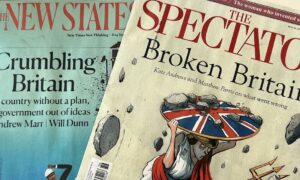For the past few years, Lisbon has been an expat hub for exchange students, digital nomads, entrepreneurs and especially for those looking to retire under the Portuguese sun. Many of those Lisbon expats are Brits, and given uncertain future of final Brexit negotiations, the situation could be about to get far more challenging for them.
The big issue at the moment is that the European Union and United Kingdom are trying to agree on a new trade deal after Brexit. But many things are at stake, here, such as:
• the fact the negotiations are taking place in the midst of a serious global pandemic and economic crisis, and the world has bigger fish to fry at the
moment.
I spoke with three Lisbon expats to hear their takes on how Brexit affected/is affecting their life decisions as well as their overall livelihoods in Lisbon.
Alex

Alex, 28, from the north of England, works for a Portuguese company that does business internationally:
The biggest issue for me is that, for a while, there was absolutely no clear information anywhere about our situation as Brits in the EU neither on the Portuguese government’s nor on the British government’s websites. I was never that worried about it. Let’s be honest; as long as you have residence here (which is not difficult to obtain), you will be fine. I recently read that I need to trade that piece of paper for a biometric card, though.
But the fact that if a Brit does not have a residence permit by the end of the year, they become an illegal immigrant is concerning, he said.
Alex also says that some of his friends found Brexit a factor in wanting to
move the EU or – if already abroad – not wanting to return home because they felt that Brexit will harm the UK economically.
It’s sad to see that life is about to become more difficult for so many young Portuguese people who see the UK as a place for study and career opportunities, he added.
“Same goes for Brits who come here to work, to set up business, or to simply retire.”

Craig
Craig, 39, a designer and a PhD student from Scotland, agrees with Alex about how unclear the rules were for a long time about obtaining residency. He is happy Portugal made the steps quite easy at the end.
“I am quite glad that I have effectively still had the rights of an EU citizen I’ve had for the past four years. But not really knowing what will happen when Brexit actually has an impact is stressful,” says Craig.
Asked whether Brexit affected his decision to come to study and to work in Portugal, Craig said yes … directly and indirectly. Brexit inspired him to become an expat and an expat in Portugal, specifically.
I had always hoped or planned to live in another country at some point but never felt it was the right time or that there was any urgency. It did not occur to me that my rights as an EU citizen would ever be at risk. When it became clear that they were, that made me more determined to exercise my freedom of movement rights, and so I felt the pressure of time to do something about it. So, perhaps in a way Brexit helped by giving me the impetus to do it.
Brexit is more than an inventive way to move abroad for the experience. It’s a way to safeguard or regain the right Craig feels have been stolen from him.
“And I think (stolen is) the right word, I feel like something I valued has been taken from me by strangers, and I wanted to be proactive in getting my rights back and not becoming resentful about it.”
That sense of Brexiteers nullifying his rights as a EU citizen figured into his choosing Portugal, which offers dual citizenship, after considering Germany and Spain, which don’t.
There were obviously other considerations. In Portugal, Craig found a PhD program in English; the people and culture are friendly; the weather is great “and I wanted to learn to surf,” he said.
“In many ways, Portugal reminds me of Scotland, not just in its size, but also the outlook people have – Brexit is substantially an English project, and based on an English attitude towards Europe that isn’t much shared in Scotland.”
Being Scottish, Craig found Brexit to be an “English project” to which he can’t relate. But he was not supportive of the Scottish independence movement during the referendum in 2014, believing the UK to be a worthwhile project.
I was happy being Scottish and British and an EU citizen. But I now feel forced to choose between them, and I definitely identify more strongly as Scottish and European than I did before.

Jeanne
Alex and Craig, as British citizens, are definitely not the only people affected by Britain’s decision to leave the European Union. Brexit also affected the decisions of Jeanne, 25, a French PhD student who only moved to Lisbon a few weeks ago. Jeanne did her master’s in Britain and wanted to pursue her PhD at her home university. She had the support of her professors but because of Brexit, she couldn’t afford it.
The rules changed in the UK, with tuition suddenly doubling for EU students, including Jeanne. “The UK has amazing universities, but the choice for me to continue my studies there was also an emotional one. It is my second home country!” she said.
After doing a lot of searching for PhD programs, Jeanne came across the right program for her in cultural studies in Lisbon.
“Pushing people away is what Brexit is all about,” she said, noting that she’s surprised that a country with such high quality of education would intend to prevent many clever and competent people from fostering the UK’s educational environment. EU citizens will now end up studying elsewhere such as Lisbon or other European cities,” she added.
Britain has been out of the EU since the end of January 2020. Since then, people worldwide are not sure how Brexit will ultimately play out. If no deal takes place between the UK and the EU, Brexit will end in lost jobs, lost freedom of mobility and the rupturing of business partnerships for people who do not have settled status. And that’s not to mention the young people who missed out on the opportunities life before Brexit offered.
Some people are quite optimistic, though. They believe there will be a deal for the sake of all the economic, political and cultural ties between the UK and the EU.
We’ll know very soon.

About the author:
Sarah Nagaty is a PhD researcher of cultural studies in Lisbon. She’s lived in Portugal for two years.
As a student of cultural studies, Sarah is drawn to what connects people from different backgrounds to new cultures and places, how they relate to their new surroundings and what kind of activities they could engage with in their new hometowns.
See all of Sarah’s Dispatches posts here.
See Dispatches’s Lisbon story archive here.
Sarah Nagaty has a PhD in cultural studies, She’s lived in Portugal for six years.
As a student of cultural studies, Sarah is drawn to what connects people from different backgrounds to new cultures and places, how they relate to their new surroundings and what kind of activities they could engage with in their new hometowns.















